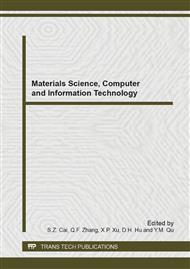[1]
Rommert Dekker, el at. On the use of installed base information for spare parts logistics: A review of ideas and industry practice. International Journal of Production Economics, vol. 143, no. 2, pp.536-545, (2013).
DOI: 10.1016/j.ijpe.2011.11.025
Google Scholar
[2]
Cimen Karatas-Cetin, Gul Denktas-Sakar. Logistics Research beyond 2000: Theory, Method and Relevance. The Asian Journal of Shipping and Logistics, vol. 29, no. 2, pp.125-144, (2013).
DOI: 10.1016/j.ajsl.2013.08.001
Google Scholar
[3]
Abduwali Mahpula, DeGang Yang, Alishir Kurban, el at. An overview of 20 years of Chinese logistics research using a content-based analysis. Journal of Transport Geography, vol. 31, pp.30-34, (2013).
DOI: 10.1016/j.jtrangeo.2013.04.011
Google Scholar
[4]
Chen Xianglian, Lin Hua. Research on e-Commerce Logistics System Informationization in Chain. Procedia - Social and Behavioral Sciences, vol. 96, no. 6, pp.838-843, (2013).
DOI: 10.1016/j.sbspro.2013.08.095
Google Scholar
[5]
Hooi Hooi Lean, Wei Huang, Junjie Hong. Logistics and economic development: Experience from China. Transport Policy, vol. 32, pp.96-104, (2014).
DOI: 10.1016/j.tranpol.2014.01.003
Google Scholar
[6]
Fei Ye, Xiande Zhao, Carol Prahinski, el at. The impact of institutional pressures, top managers' posture and reverse logistics on performance—Evidence from China. International Journal of Production Economics, vol. 143, no. 1, pp.132-143, (2013).
DOI: 10.1016/j.ijpe.2012.12.021
Google Scholar
[7]
Hanna Grzybowska, Jaume Barceló. Decision Support System for Real-Time Urban Freight Management. Procedia - Social and Behavioral Sciences, vol. 39, pp.712-725, (2012).
DOI: 10.1016/j.sbspro.2012.03.142
Google Scholar
[8]
Jose Tongzon, Hong-Oanh (Owen) Nguyen. China's economic rise and its implications for logistics: The Australian case. Transport Policy, vol. 16, no. 52, pp.224-231, (2009).
DOI: 10.1016/j.tranpol.2009.08.008
Google Scholar


